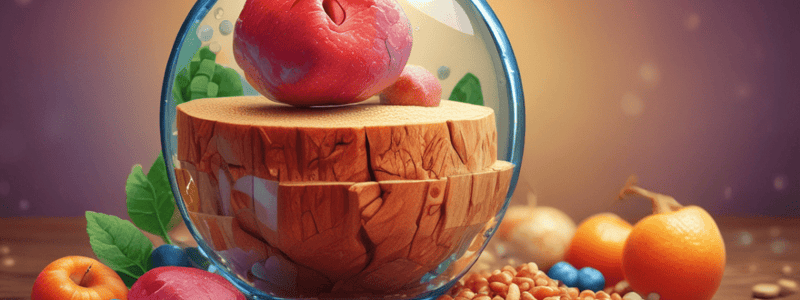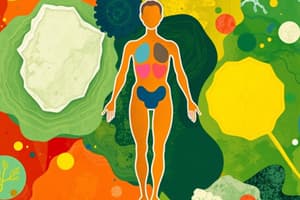Podcast
Questions and Answers
What is the term used to describe trace elements that are needed by the body in very small amounts?
What is the term used to describe trace elements that are needed by the body in very small amounts?
- Ultratrace elements
- Micronutrients (correct)
- Macronutrients
- Essential minerals
If someone suggests drinking milk to address a low iron level, what false assumption might they be making?
If someone suggests drinking milk to address a low iron level, what false assumption might they be making?
- Milk enhances iron absorption (correct)
- Milk is high in iron
- Milk hinders iron absorption
- Iron deficiency is due to a lack of dairy consumption
What mineral is associated with the prevention of goiter and is commonly found in seafood?
What mineral is associated with the prevention of goiter and is commonly found in seafood?
- Selenium (correct)
- Chromium
- Copper
- Manganese
If a person's family members have goiter and dislike seafood, what mineral deficiency could be contributing to their condition?
If a person's family members have goiter and dislike seafood, what mineral deficiency could be contributing to their condition?
What mineral is often added to water supplies to prevent tooth decay?
What mineral is often added to water supplies to prevent tooth decay?
How can diet affect the bioavailability of trace minerals?
How can diet affect the bioavailability of trace minerals?
What is the term used for elements needed in even smaller amounts than trace elements?
What is the term used for elements needed in even smaller amounts than trace elements?
'Fluoridation is overdone' is an argument mainly related to which mineral?
'Fluoridation is overdone' is an argument mainly related to which mineral?
What role does iron play in the body?
What role does iron play in the body?
What are some important trace minerals mentioned in the text?
What are some important trace minerals mentioned in the text?
What is the main focus of discussing trace mineral deficiency in the text?
What is the main focus of discussing trace mineral deficiency in the text?
Which minerals are involved in the absorption, transport, storage, and turnover of iron as per the text?
Which minerals are involved in the absorption, transport, storage, and turnover of iron as per the text?
What does the term 'trace elements' refer to in the context of nutrition?
What does the term 'trace elements' refer to in the context of nutrition?
What is the role of trace minerals as highlighted in the text?
What is the role of trace minerals as highlighted in the text?
How do trace minerals differ from major minerals in terms of dietary requirements?
How do trace minerals differ from major minerals in terms of dietary requirements?
What can be a consequence of fluoridation of water supply discussed in the text?
What can be a consequence of fluoridation of water supply discussed in the text?
Which minerals are NOT classified as trace or ultratrace minerals according to the text?
Which minerals are NOT classified as trace or ultratrace minerals according to the text?
What aspect of metabolism do trace minerals affect?
What aspect of metabolism do trace minerals affect?
What are the consequences of severe iodine deficiency during pregnancy?
What are the consequences of severe iodine deficiency during pregnancy?
How does iodine toxicity affect the synthesis of thyroid hormones?
How does iodine toxicity affect the synthesis of thyroid hormones?
What is the primary function of copper in the body?
What is the primary function of copper in the body?
How is copper primarily absorbed by the body?
How is copper primarily absorbed by the body?
What is the main role of iodine in the body?
What is the main role of iodine in the body?
What is a common symptom of iodine deficiency?
What is a common symptom of iodine deficiency?
Which condition can result from severe iodine deficiency?
Which condition can result from severe iodine deficiency?
How does iodine toxicity affect the thyroid gland?
How does iodine toxicity affect the thyroid gland?
What happens to excess copper in the body?
What happens to excess copper in the body?
What is the leading cause of poisoning deaths in young children in the U.S.?
What is the leading cause of poisoning deaths in young children in the U.S.?
Which function does zinc serve as a cofactor for major enzymes?
Which function does zinc serve as a cofactor for major enzymes?
What is the key component of the enzyme that activates ____ in the retina?
What is the key component of the enzyme that activates ____ in the retina?
Which system is vital to fighting infection and requires zinc?
Which system is vital to fighting infection and requires zinc?
What inhibits the absorption of zinc?
What inhibits the absorption of zinc?
What percentage of zinc is absorbed compared to iron?
What percentage of zinc is absorbed compared to iron?
Which condition can lead to severe organ damage and chronic disease due to chronic iron overload?
Which condition can lead to severe organ damage and chronic disease due to chronic iron overload?
What is the role of chromium in glucose metabolism?
What is the role of chromium in glucose metabolism?
How is chromium transported in the body?
How is chromium transported in the body?
In what form is chromium excreted from the body?
In what form is chromium excreted from the body?
What inhibits the absorption of dietary copper?
What inhibits the absorption of dietary copper?
Which trace element is known to be an enzyme cofactor?
Which trace element is known to be an enzyme cofactor?
What are sources of molybdenum in the diet?
What are sources of molybdenum in the diet?
'Difficult to determine' refers to the evaluation of chromium ___.
'Difficult to determine' refers to the evaluation of chromium ___.
Flashcards are hidden until you start studying
Study Notes
What Are Trace Elements?
- Trace elements, also known as trace minerals, are essential nutrients required in small amounts, typically in milligram or microgram quantities.
- They differ from major minerals in terms of dietary requirements and total amount in the body.
- Importance of trace elements:
- Cofactors for enzymes
- Components of hormones
- Participants in oxidation-reduction reactions
Iron
- Functions:
- Component of hemoglobin and myoglobin
- Essential for oxygen transport and storage
- Component of enzymes involved in energy metabolism
- Deficiency:
- Anemia
- Fatigue
- Pale skin
- Poor concentration
- Increased infections
- Toxicity:
- Accidental iron overdose leading cause of poisoning deaths in young children in the US
- Genetic defect: hemochromatosis, causes excessive iron absorption and chronic iron overload
Zinc
- Functions:
- Cofactor for major enzymes
- Helps fold proteins into functional shapes
- Helps control diverse functions, including gene expression, cell death, and nerve transmission
- Enzymes:
- Provide structural integrity or activate catalytic ability
- Nucleic acid metabolism linked to gene expression
- Immune system vital to fighting infection
- Vision key component of enzyme that activates retinal
- Regulation:
- Absorption similar to iron, only about 10-35% of zinc absorbed
- Phytate inhibits absorption
- Transportation, distribution, and excretion circulates bound to protein
Iodine
- Functions:
- Thyroid hormone production
- Regulation of body temperature, basal metabolic rate, reproduction, and growth
- Absorption and metabolism:
- Effective absorption (95-100%)
- Mostly excreted in urine
- Deficiency:
- Enlarged thyroid gland (goiter)
- Cold intolerance, weight gain, sluggishness, decreased body temperature
- Severe iodine deficiency during pregnancy: prenatal death, birth defects, cretinism (stunted growth, deaf, mute, mentally retarded), and infant mortality
- Toxicity:
- High amounts of iodine inhibit synthesis of thyroid hormones
- Stimulated growth of the thyroid gland
Copper
- Functions:
- Acts as antioxidant
- Participates in electron transport chain
- Biosynthesis of melanin, collagen, and elastin
- Assists with myelinization
- Component of ceruloplasmin
- Absorption and metabolism:
- ~50% absorbed
- Albumin transports copper from intestinal cells to liver
- 2/3rd incorporated into ceruloplasmin
- Body stores little copper
Other Trace Elements
- Selenium:
- Acts as antioxidant
- Component of glutathione peroxidase
- Chromium:
- Enhances effects of insulin
- Absorption low and tied to need
- Transportation by transferrin and albumin
- Excretion in urine
- Manganese:
- Enzyme cofactor
- Absorption efficient
- Dietary copper only significant inhibitor
- Sources: peas, beans, breakfast cereals, and organ meats
- Molybdenum:
- Enzyme cofactor
- Absorption efficient
- Dietary copper only significant inhibitor
- Sources: peas, beans, breakfast cereals, and organ meats
- Fluoride:
- Important for bone and tooth development
- Component of bone and tooth enamel
- Deficiency: tooth decay and osteoporosis
- Other trace elements and ultratrace elements:
- Arsenic, boron, nickel, silicon, and vanadium
- Thought to be essential in very low amounts, but specific biochemical functions unknown
Studying That Suits You
Use AI to generate personalized quizzes and flashcards to suit your learning preferences.





